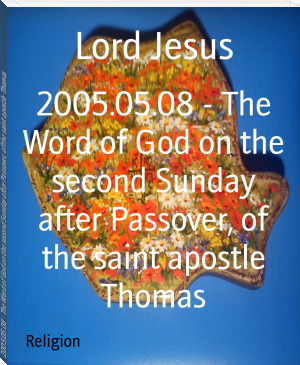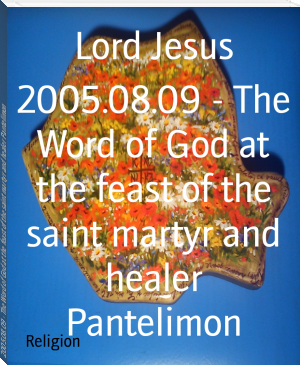The Story of a Soul - Saint Thérèse de Lisieux (best color ereader .TXT) 📗

- Author: Saint Thérèse de Lisieux
- Performer: -
Book online «The Story of a Soul - Saint Thérèse de Lisieux (best color ereader .TXT) 📗». Author Saint Thérèse de Lisieux
It is told in the Lives of the Fathers of the Desert how one of them converted a public sinner, whose evil deeds were the scandal of the whole country. This wicked woman, touched by grace, followed the Saint into the desert, there to perform rigorous penance. But on the first night of the journey, before even reaching the place of her retirement, the bonds that bound her to earth were broken by the vehemence of her loving sorrow. The holy man, at the same instant, saw her soul borne by Angels to the Bosom of God.
This is a striking example of what I want to say, but these things cannot be expressed. Dearest Mother, if weak and imperfect souls like mine felt what I feel, none would despair of reaching the summit of the Mountain of Love, since Jesus does not ask for great deeds, but only for gratitude and self-surrender.
He says: "I will not take the he-goats from out of the flocks, for all the beasts of the forests are mine, the cattle on the hills and the oxen. I know all the fowls of the air. If I were hungry, I would not tell thee, for the world is Mine, and the fulness thereof. Shall I eat the flesh of bullocks, or shall I drink the blood of goats? Offer to God the sacrifice of praise and thanksgiving."[5]
This is all Our Lord claims from us. He has need of our love—He has no need of our works. The same God, Who declares that He has no need to tell us if He be hungry, did not disdain to beg a little water from the Samaritan woman. He was athirst, but when He said: "Give me to drink,"[6] He, the Creator of the Universe, asked for the love of His creature. He thirsted for love.
And this thirst of Our Divine Lord was ever on the increase. Amongst the disciples of the world, He meets with nothing but indifference and ingratitude, and alas! among His own, how few hearts surrender themselves without reserve to the infinite tenderness of His Love. Happy are we who are privileged to understand the inmost secrets of Our Divine Spouse. If you, dear Mother, would but set down in writing all you know, what wonders could you not unfold!
But, like Our Blessed Lady, you prefer to keep all these things in your heart.[7] To me you say that "It is honourable to reveal and confess the world of God."[8] Yet you are right to keep silence, for no earthly words can convey the secrets of Heaven.
As for me, in spite of all I have written, I have not as yet begun. I see so many beautiful horizons, such infinitely varied tints, that the palette of the Divine Painter will alone, after the darkness of this life, be able to supply me with the colours wherewith I may portray the wonders that my soul descries. Since, however, you have expressed a desire to penetrate into the hidden sanctuary of my heart, and to have in writing what was the most consoling dream of my life, I will end this story of my soul, by an act of obedience. If you will allow me, it is to Jesus I will address myself, for in this way I shall speak more easily. You may find my expressions somewhat exaggerated, but I assure you there is no exaggeration in my heart—there all is calm and peace.
O my Jesus, who can say how tenderly and gently Thou dost lead my soul! The storm had raged there ever since Easter, the glorious feast of Thy triumph, until, in the month of May, there shone through the darkness of my night one bright ray of grace. . . . My mind dwelt on mysterious dreams sent sometimes to Thy favoured ones, and I thought how such a consolation was not to be mine—that for me, it was night, always the dark night. And in the midst of the storm I fell asleep. The following day, May 10, just at dawn, I dreamt that I was walking in a gallery alone with Our Mother. Suddenly, without knowing how they had entered, I perceived three Carmelites, in mantles and long veils, and I knew that they came from Heaven. "Ah!" I thought, "how glad I should be if I could but look on the face of one of these Carmelites!" And, as if my wish had been heard, I saw the tallest of the three Saints advance towards me. An inexpressible joy took possession of me as she raised her veil, and then covered me with it.
At once I recognised our Venerable Mother, Anne of Jesus, foundress of the Carmel in France.[9] Her face was beautiful with an unearthly beauty; no rays came from it, and yet, in spite of the thick veil which enveloped us, I could see it suffused by a soft light, which seemed to emanate from her heavenly countenance. She caressed me tenderly, and seeing myself the object of such affection, I made bold to say: "Dear Mother, I entreat you, tell me, will Our Lord leave me much longer in this world? Will He not soon come to fetch me?" She smiled sweetly, and answered, "Yes, soon . . . very soon . . . I promise you." "Dear Mother," I asked again, "tell me if He does not want more from me than these poor little acts and desires that I offer Him. Is He pleased with me?" Then our Venerable Mother's face shone with a new splendour, and her expression became still more gracious: "The Good God asks no more of you," she said, "He is pleased, quite pleased," and, taking my head between her hands, she kissed me so tenderly that it would be impossible to describe the joy I felt. My heart was overflowing with gladness, and, remembering my Sisters, I was about to beseech some favour for them, when, alas! I awoke. My happiness was too great for words. Many months have passed since I had this wonderful dream, and yet its memory is as fresh and delightful as ever. I can still picture the loving smiles of this holy Carmelite and feel her fond caresses. O Jesus! "Thou didst command the winds and the storm, and there came a great calm."[10]
On waking, I realised that Heaven does indeed exist, and that this Heaven is peopled with souls who cherish me as their child, and this impression still remains with me—all the sweeter, because, up to that time, I had but little devotion to the Venerable Mother Anne of Jesus. I had never sought her help, and but rarely heard her name. And now I know and understand how constantly I was in her thoughts, and the knowledge adds to my love for her and for all the dear ones in my Father's Home.
O my Beloved! this was but the prelude of graces yet greater which Thou didst desire to heap upon me. Let me remind Thee of them to-day, and forgive my folly if I venture to tell Thee once more of my hopes, and my heart's well nigh infinite longings—forgive me and grant my desire, that it may be well with my soul. To be Thy Spouse, O my Jesus, to be a daughter of Carmel, and by my union with Thee to be the mother of souls, should not all this content me? And yet other vocations make themselves felt—I feel called to the Priesthood and to the Apostolate—I would be a Martyr, a Doctor of the Church. I should like to accomplish the most heroic deeds—the spirit of the Crusader burns within me, and I long to die on the field of battle in defence of Holy Church.
The vocation of a Priest! With what love, my Jesus, would I bear Thee in my hand, when my words brought Thee down from Heaven! With what love would I give Thee to souls! And yet, while longing to be a Priest, I admire and envy the humility of St. Francis of Assisi, and am drawn to imitate him by refusing the sublime dignity of the Priesthood. How reconcile these opposite tendencies?[11]
Like the Prophets and Doctors, I would be a light unto souls, I would travel to every land to preach Thy name, O my Beloved, and raise on heathen soil the glorious standard of Thy Cross. One mission alone would not satisfy my longings. I would spread the Gospel to the ends of the earth, even to the most distant isles. I would be a Missionary, not for a few years only, but, were it possible, from the beginning of the world till the consummation of time. Above all, I thirst for the Martyr's crown. It was the desire of my earliest days, and the desire has deepened with the years passed in the Carmel's narrow cell. But this too is folly, since I do not sigh for one torment; I need them all to slake my thirst. Like Thee, O Adorable Spouse, I would be scourged, I would be crucified! I would be flayed like St. Bartholomew, plunged into boiling oil like St. John, or, like St. Ignatius of Antioch, ground by the teeth of wild beasts into a bread worthy of God.[12]
With St. Agnes and St. Cecilia I would offer my neck to the sword of the executioner, and like Joan of Arc I would murmur the name of Jesus at the stake.
My heart thrills at the thought of the frightful tortures Christians are to suffer at the time of Anti-Christ, and I long to undergo them all. Open, O Jesus, the Book of Life, in which are written the deeds of Thy Saints: all the deeds told in that book I long to have accomplished for Thee. To such folly as this what answer wilt Thou make? Is there on the face of this earth a soul more feeble than mine? And yet, precisely because I am feeble, it has delighted Thee to accede to my least and most child-like desires, and to-day it is Thy good pleasure to realise those other desires, more vast than the Universe. These aspirations becoming a true martyrdom, I opened, one day, the Epistles of St. Paul to seek relief in my sufferings. My eyes fell on the 12th and 13th chapters of the First Epistle to the Corinthians. I read that all cannot become Apostles, Prophets, and Doctors; that the Church is composed of different members; that the eye cannot also be the hand. The answer was clear, but it did not fulfill my desires, or give to me the peace I sought. "Then descending into the depths of my nothingness, I was so lifted up that I reached my aim."[13]
Without being discouraged I read on, and found comfort in this counsel: "Be zealous for the better gifts. And I show unto you a yet more excellent way."[14] The Apostle then explains how all perfect gifts are nothing without Love, that Charity is the most excellent way of going surely to God. At last I had found rest.
Meditating on the mystical Body of Holy Church, I could not recognise myself among any of its members as described by St. Paul, or was it not rather that I wished to recognise myself in all? Charity provided me with the key to my vocation. I understood that since the Church is a body composed of different members, the noblest and most important of all the organs would not be wanting. I knew that the Church has a heart, that this heart burns with love, and that it is love alone which gives life to its members. I knew that if this love were extinguished, the Apostles would no longer preach the Gospel, and the Martyrs would refuse to shed their blood. I understood that love embraces all vocations, that it is all things, and that it reaches out through all the ages, and to the uttermost limits of the earth, because it is eternal.
Then, beside myself with joy, I cried out: "O Jesus, my Love, at last I have found my vocation. My vocation is love! Yes, I have found my place in the bosom of the Church, and this place, O my God, Thou hast Thyself given to me: in the heart of the Church, my Mother, I will be LOVE! . . . Thus I shall be all things: thus will my dream be realised. . . ."
Why do I say I am beside myself with joy? This does not convey my thought. Rather is it peace which has become my portion—the calm peace of the sailor when he catches sight of the beacon which lights him to port. O luminous Beacon of Love! I know how to come even unto Thee, I





Comments (0)